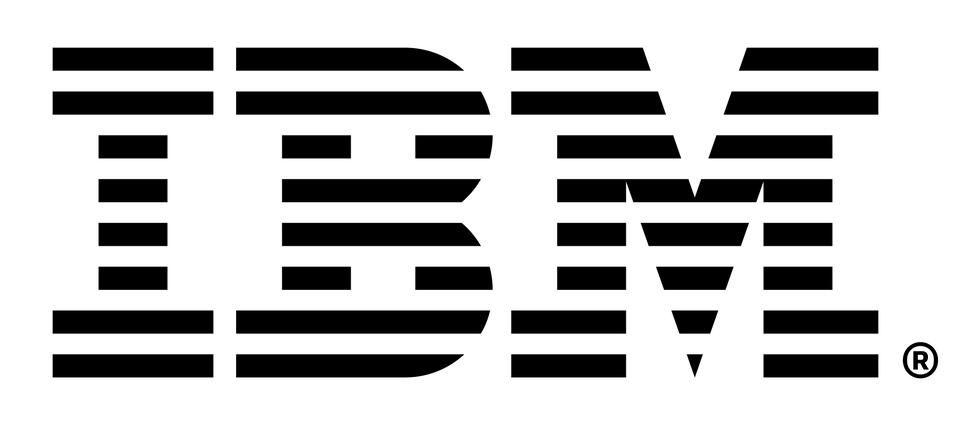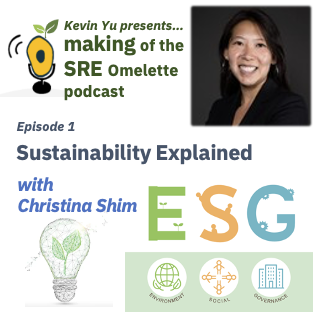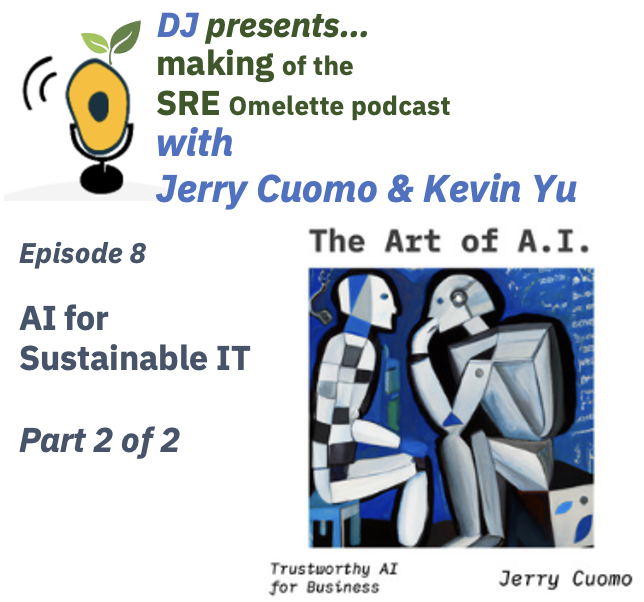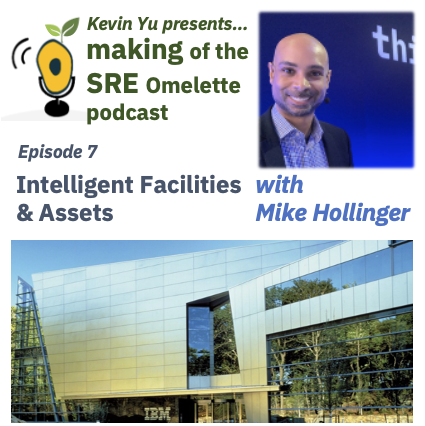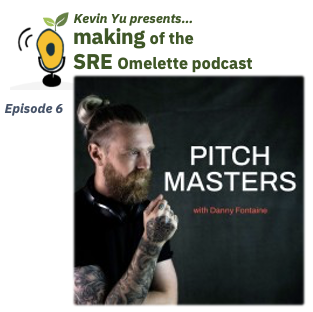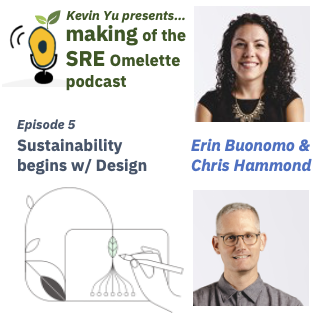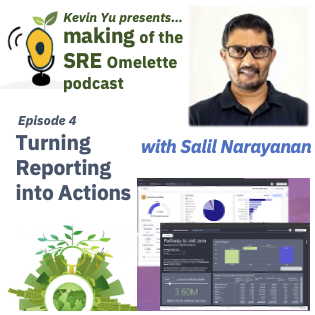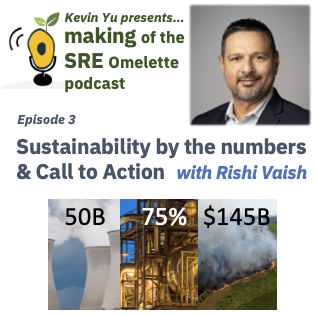Episode 1 - Sustainability Explained
- 0.5
- 1
- 1.25
- 1.5
- 1.75
- 2
Christina: It's really about development that meets the needs of what we need to do in the present day without compromising the ability of future generations to meet their own needs. Of course, we need to meet the demands of today. We also need to make sure that we're not taking away from the demands of tomorrow.
Kevin: Hi everyone. Welcome back to the first episode of season two of the Making of the SRE Omelette podcast, where we explore achieving business and client success outcome via the practice of site reliability engineering. If you're listening for the first time and wonder what does an omelette has to do with SRE, it is based on the analogy that culture is the outcome of what we do. So in the context of the chicken or the egg, it is like an omelette. In season one of the show, we focused on the culture and practice to achieve the reliability engineering outcome. Season two is all about how the practice of site reliability engineering can play a big part in helping and leading us to a more sustainable future. Sustainability is a popular topic these days, but what exactly is sustainability? What is this ESG thing and why the buzz now? Join us to demystify sustainability and to kick off season two is Christina Shim. Christina is a VP and global head of product of IBM sustainability software. I'm so excited to have her here with us today. Welcome to the show, Christina.
Christina: Thank you. Great to be here. Thanks for having me.
Kevin: Christina, I know you are passionate about sustainability. It is not only your day job, but you have also done give back via volunteering. Can you start off by sharing with the audience your journey that led you to this impactful role you have with IBM today?
Christina: Sure. So I will say that I think even from when I was in university, I really felt the importance of doing something that was bigger than myself, however you want to define impact. So that was everything from working at local nonprofits and volunteering at hospitals, to thinking about majoring in public policy, etc. So I think that going all the way back impact was very important to me. I worked in federal government for a few years. And even when I worked in management consulting which was the vast majority of my career, I did it in a way where I was kind of bridging at the intersection of technology, business strategy and impact. So we would work with, for example, nonprofits or we'd work on cybersecurity issues to make sure that we were helping with consumer and security. Or working with employees to make sure that they were really understanding the mission of the organization, et cetera. So my journey has been not the straightest path. However, I think everything kind of tied into that intersection that I mentioned. And most recently before I joined IBM, I was at a global impact firm called Palladium. And they do impact projects ranging from reforestation in Brazil to building public health clinics in India and kind of everything in between. And they were primarily working with different government agencies on this and wanted me to come help build out their corporate practice from a consulting lens. So that's what I did, and it essentially evolved into a sustainability and ESG practice because that's what a lot of companies were starting to focus on at that time. And so when Cream and organization and IBM reached out, and this is now about a year and a half ago, he was looking at the time for somebody to help build the strategy for our software brand and to thread the idea of sustainability through that. And I really loved the vision that he had and I had not really done it as it related to a product's portfolio. So it was really interesting to me. And so that's where I came in. That was kind of my foray into IBM. And I then took over for product management in January of 2023 as well. I now have strategy and product management for the sustainability software brand. And I think it's been really amazing just like the momentum that we're seeing in the market, the momentum that we see within our own teams. The rallying around what we're doing for sustainability and to support our customers along their journey. So it's been really amazing and even to see how far we're going and continue to go with IBM's corporate journey, that's been really fun to be a part of as well. In a gist, that's where this has all come from.
Kevin: Wow, Christina, what an incredible journey. Thank you for sharing it with us. You're an inspiration for everyone who wants to do something that's bigger than ourselves, get started, jump in and always have impact in the site. I'm so glad Karin reached out to you and you joined us in this sustainability journey.
Christina: Kevin, the other thing I think and I talked about too when we saw each other is we have kids. And this is not just for us and what we want to be doing, but this is also the world in which our kids are growing up and what we want for them and future generations. And I think we can talk about this more, I think we will, but it's not just about climate and it's not just about greenhouse gas emissions. It's about what does that mean for communities? How does that affect social issues? How does that affect how people are treated or how they think about where they need to live or the kind of community or what kind of safeguards or security that they need. There are a lot of manifestations and implications that I think that people are not really thinking about. And for us who have responsibilities as parents, I think it's really important for us to think about beyond just what do I want to do for myself and what's important for me.
Kevin: Yeah, totally. So let's get right to it. Sustainability is a buzz these days, but as you're getting at, it is much more than just carbon emissions. Can you get us started by explaining what is sustainability?
Christina: So the way that I think of sustainability is it's much broader than I think a lot of people think about. Sustainability to me, if you look at the United Nations definition, it's all about how we can leave the planet better off for the next generation than we currently are now. It's really about development that meets the needs of what we need to do in the present day without compromising the ability of future generations to meet their own needs. So that goes to kind of what we were just talking about, right Kevin?
Kevin: The outcome.
Christina: Exactly. And it's about, of course we need to meet the demands of today, we also need to make sure that we're not taking away from the demands of tomorrow. I think of that across all areas, meaning it's not like I was saying just about greenhouse gas emissions or net- zero targets or all the things that people are talking about now. I do think there's a little bit of a danger in carbon tunnel visioning that's happening where people are just focusing on that and not thinking about or hearing or understanding how it affects the communities that we live in, the people. One example of this that's very concrete is a lot of urban neighborhoods don't have playgrounds that are covered by trees. They're mostly neighborhoods that have a lot of concrete. And concrete because it's black tends to absorb a lot of the heat from the sun. So it becomes almost impossible to play on the concrete just because it's so hot. Now, take that and then take the fact that there's no trees that are covering playgrounds, you're affecting the entire community of parents, of children, of anybody that's there that maybe wants to congregate and enjoy this social facility. So you're really taking away from the community in that regard. It's a very concrete example of something that everybody every day can understand. So these are the type of things that I think people don't necessarily think about. It's not just about how bad your car is with the fumes or with the exhaust inaudible, it's much bigger than that. So that's how I think about sustainability. It's really about the entire ecosystem of all the key stakeholders, in order to make sure that we are really taking care of the entirety of the chain from top to bottom and not just what is happening on the ground with that one particular entity. And I think people use the moniker ESG around environmental, social and governance, that's really kind of a framework that you could use around this. But sustainability to me is much bigger than that. It's about what I mentioned earlier about what can we do to make sure that we are surviving today without taking away from what we need to survive for tomorrow. And what does that mean in terms of the broader ecosystem? I'll give you one other example. Some of the projects that I used to work on, for example, we talk about large chocolate companies. Again, this is something that everyone can kind of relate to. Large chocolate companies they make chocolate and they say, " Oh, we're really having a hard time finding good quality and high quantity of cocoa to go into our chocolate." And you ask them, " Okay, so what are some of the sustainability initiatives that you have?" And they'll say, " Oh, well, we're donating to this nonprofit and we're focusing on this, and we're investing in these areas, and we built a soccer stadium for..." Whatever they're doing. Not to say that those are bad intentions or bad initiatives, those are all great. However, if for example that chocolate company invested in their entire value chain all the way back to the farmers. And instead of the millions of dollars that they were spending building a soccer stadium, they spent those dollars investing in their value chain then it could help to one, ensure that there's increased transparency and traceability across that value chain. Two, enable the farmers all the way back to have the right technology and the right guidance and the right people to perhaps grow more and higher quality cocoa that would go into the chocolate. And so really, they're solving for their own problem by investing in something that is also very sustainable, helps across a multitude of areas. And it's also very critical for the core of that company's business rather than just donating money to random initiatives here and there or to random nonprofits here and there. And so I think that's the way tactically that I think about sustainability is like, what can you do that's really core to and within your own ecosystem, business ecosystem or your personal ecosystem that can make a real difference. It's not just about throwing money at a good cause, and I really think that that's very important as well.
Kevin: Well, thank you, Christina. I definitely gained a new perspective on what sustainability means, and I like your capture of consideration for the entire ecosystem of stakeholders versus perhaps carbon tunnel visioning. And a great definition of leaving the planet better off than we are now, meet today's needs, and also making sure demands of tomorrow can be met as well. I love it. I'm going to steal it for future use, definitely. Speaking of chocolate, I remember looking at a supply chain solution with having a QR code showing the journey of the product that led to the shelf. So imagine how consumers may be influenced by seeing the sustainability considerations of the chocolate bar. You also touch on ESG, and as you mentioned, it is often used as a framework for sustainability. Can you explain to the audience what is ESG?
Christina: So ESG stands for environmental, social and governance. It's typically a set of standards that's used to address company's behavior or organizational behavior. So this can be used in a variety of ways. Like if a company has ESG standards or metrics, they will say, " Well, this is what we're doing against our environmental goals and this is what we're doing against our social goals. And this is the governance that we're putting in around that." And so examples of that, like environmental goals could be the net- zero, the social goals could be they're helping to support upskill or they could be focused on diversity and inclusion areas. And governance, again is kind of either the data governance or the management governance around that. So that's typically how ESG is being used in terms of the framework. It's really like a way for companies to understand the impact that they're having across those three areas and how they want to be using that framework to assess their business practices and their performance across those three areas. It makes it so it's a little bit cleaner, if you will. It's become a bit more standardized. I think the danger of this is that not everything, or I should say nothing, is really as easily separated as this goes onto the environmental bucket, this goes into the social bucket, and this goes into the governance bucket. I also think that they're not definitely mutually exclusive. And then on top of that, I think there could be areas that we're not necessarily discussing because of that framework. In my personal perspective, if it helps people to understand a little bit better about how to think about this from a framework perspective, that's fine. But I do want your listeners to think about this a little bit more broadly than just what fits into an ES or G bucket. And I think increasingly with a lot of conversations that are happening in the market, people are just trying to think about what does this mean more broadly. Even IBM's impact report, while we do for sure talk about ESG we also talk about the triangle of Es, which is environmental, ethical, and equitable, which I actually really like because think about it from everything that we're doing around ethics and equity. So it's not just about what fits into these three buckets, but kind of a triangular look, multifaceted look around how is what we're deciding to do making us a more equitable company or providing additional opportunities for equity for our communities and for our employees? How is what we're doing an ethical decision? I think these are really important characteristics that we also need to be thinking about.
Kevin: There you go listeners, call to action from Christina. ESG is a good framework to help us get started to have the conversation, but do not let it stop at what fits into the bucket of ESG. I'll make a link to IBM's impact report while I publish this episode. And I also really like the triangle of Es, environmental, ethical, and equitable, a great set of considerations to add to our sustainability discussions. And again, going back to leaving it better off than we found it. So Christina, who wouldn't want to leave the place better than we found it? And the talk of sustainability isn't new. I believe the United Nations definition you spoke of came out in the'80s. What has changed that led to companies and organizations to all of a sudden want to act versus simply talk about it?
Christina: I think there's a few things. I would say the biggest change here has really been around the increase in regulations. That has really forced companies in particular to start thinking about this in a real way as it relates to their company's operations. But there are also other factors that have gotten us there. So an increase in consumer awareness and the pressures from consumers to say, like you mentioned before, " I'm going to buy this from this brand, not this brand." Or, " I'm going to work for this company and not this company." I think that those are really important factors that the market was starting to acknowledge. Then you also add in there the increased investor pressure, meaning investors were starting to also think about what does this mean for my portfolio of companies that I'm investing in? Do I consider that if they have a stronger sustainability posture that they perhaps might be a better company to invest in? Are we seeing some results, which we did. We started seeing some strong data points that investing in certain companies with better ESG or better sustainability postures would actually provide a better return on investment. Yes. Well, that of course, I want to be investing in more companies like that. So you started seeing this and then increasingly started seeing certifications around this. And you started seeing more and more nonprofits like B Labs and others that were talking about working with companies to make sure that they were, I guess, articulating across a couple of different areas that would allow for them to either be accredited in certain areas or not. But I think a lot of this then started ground swelling up and then go back to what I first said, which is the regulations have really been the kicker because now it's not just a nice to have, it's a must have. A lot of the regulations that we're starting in the EU have now crossed oceans, and you're seeing a lot more with Asia- Pacific region, in the US, even the Inflation Reduction Act here. And all of the incentives that the Act gives to companies trying to promote renewable energy and electric vehicles and all of these things, it's really made a huge difference. Germany just passed a law that requires addressing human rights around your supply chain. So again, it's not just environmental, it's also social. And I think that increasingly it will just be a normal course of business, but right now there's so much discussion around it because companies just weren't aware of how to think about this before. And all of a sudden they're being forced to and they're not necessarily sure how to go about doing that.
Kevin: In my experience, people and companies are influenced to change their behavior based on either a carrot or a stick. Christina, do you see companies doing it without the regulation in place?
Christina: There definitely have been a few companies that we saw they were very early on addressing this, regardless of whether or not regulations were coming into effect or not. Most likely they're probably better positioned now than other companies that were not necessarily thinking about it. So I think those companies were addressing my earlier points around they were doing what they felt like was the right thing to do. So it was kind of a corporate mission and it's got to be led on high. So we're talking about the CEOs who are saying, " This is important to me." And they were listening to their customers. And if a lot of their customers were coming from the youth or Gen Z or millennial generations, then they wanted to make sure that it was part of their DNA. Companies like Patagonia, for example, this has been important to them since the beginning of time for them. The founders were always very much... They joked about, we hope you don't have to buy our products. Meaning they want their products to last so long, or that you can recycle them in a way that you don't have to buy new products and use new materials. There are definitely folks out there that have built businesses or took over businesses and had this philosophy before regulation forced them to. And I think a lot of consumers really they found value in that, and they supported those brands to the extent that they could or that they were interested in those products.
Kevin: Take on support, would consumers today buy a brand that is more expensive knowing it is more sustainable?
Christina: So that's one thing I would actually be careful about. I do think there's a lot of surveys that show that people would pay more. I actually don't do that. I don't think that's true. I think that people respond to surveys differently than what they would actually do, and I've spoken... It's easy to click a box saying that, " Yeah, of course I would do that but then when actually push comes to shove their wallet, will they really? I've spoken with a few CEOs and COOs who said that they believe those studies and they're not true. They actually went out, they invested in certain areas and they found that customers were not actually willing to pay more for certain products. So I would be very careful about using that statistic. I actually don't believe that that's true. What I do believe is that people will make certain brand decisions if they believe that one brand is more ethical or more sustainable than another, more broadly. But I think that what's inherently important is that companies realize the value of this more broadly, and it becomes something that is inherent and ingrained in all of their products. And not necessarily like, oh, because this is a more sustainable product we're going to charge more for it. That can't be the case in a generation from now. It has to be that this is just the normal course of business because that's the only way that this is going to work.
Kevin: Ultimately, we'll have to make being sustainable on what we do, very much like reliability engineering not just a point in time activity. So Christina, you gave me a thought, and we're going off the script here. What do you think the future will look like where we know we have arrived at that moment you spoke of?
Christina: I hope that the future is one where we don't even talk about sustainability because it's just embedded in all of the decision- making processes for any company or organization. I hope that there is no such thing as a chief sustainability officer, again, because it's embedded as part of what every part of the business is doing. And I hope that every single company and every single consumer down the line is producing and using less than the generation before it. So I think that's metrics for success for the future. We have a long way to go, inaudible.
Kevin: Yeah, but that's a really good capture. I think that's a future we can all look forward to. So Christina, I think you may have just inspired many people with our future. Any hints and guidance you can give to someone, for example, a chief sustainability officer that's still required today to get started?
Christina: Whenever I speak to this question, I answer it in a couple of different ways. So one is you're probably already doing a few things that you don't think of as a quote unquote" sustainability initiative". So from both a company and a personal perspective, everyone wants to do things that require less energy. Why? Because energy costs money and you want to spend less. It's more sustainable, it's better for the bottom line. So those are things that are already happening, like companies that are already buying some of our IBM products, Kevin for example, they're using them for predictive maintenance, and for energy efficiency, and for workload balancing and all things that are good for sustainability practices regardless. I think that more broadly, I would really encourage the chief sustainability officers, the chief impact officers, the consumers, everybody that's listening, I think what's really critical is thinking about it across your entire personal and professional ecosystem. How is this affecting not just what carbon or methane or sulfur emissions, that might be something that you're emitting and that you have to manage and calculate and report on, but how is this also affecting the people in your community, your employees, your value and your supply chain, all of the things that we lose sight of. I would encourage people to think about it a little bit more deeply from that level. And then there's a lot of tactical ways to act as well. I guess from an enterprise perspective, do you have the technology that helps you to accelerate to achieving your sustainability goals? A lot of companies are still trying to manage things by spreadsheet to where we need to get to for success. So if it's not going to be by spreadsheet, what sort of technology can you use to help you to leverage AI and machine learning and all the things that we as human beings have created to help accelerate? Get to a certain point where we couldn't be doing manually. And I think on a personal front as well, just thinking about lessening your footprint with day- to- day decisions that might help, washing your clothes with cold water, investing in companies that have a strong ESG posture. These are all things that we could decide to do on a daily basis that could make a big difference. I think that there's a lot of things that people can do. I think there's a sense of like, oh, there's not as much that I could do from an individual perspective as there is from a company perspective. And while I think on an absolute basis that's true, if you think about all the decisions that we all are making in both a personal lives and our professional lives, we can magnify and accelerate a lot of those decisions by compounding them together. So if you, Kevin, me, Christina, and Joe, Beth, Annie and Liz are all doing similar things, that's compounded from a personal perspective. And then if all six of us, whatever our jobs are where we have some sort of influence in trying to think about this from a sustainability lens, maybe the next catering party we host, we decide not to use single use plastic. Or if we're working in a factory, maybe we talk to our manager about, " Hey, I think we can maybe be a little bit more efficient here. Maybe we should look into some of the technology that we might have that will help and it'll save us money in the long run." There are ways that we could be doing this across our personal and professional lives every day, and so I encourage everyone to think about that.
Kevin: That is another great call to action for all of us to take at the personal, team and organization level to make a difference. Putting on the site reliability engineering lens, a big outcome of the practice is to reduce toil. And I beat up on the spreadsheet and reporting, again, who wouldn't want to eliminate having to report the same data multiple times? I would love to see us get to a way of reporting it on the glass to eliminate toil and redundant work.
Christina: Agreed.
Kevin: With it, we arrive at the last question of the episode, we go back to the inspiration of the podcast, making of the SRE omelette. In that culture and behavior is the outcome of what we do. In the context of the chicken or the egg, it is like an omelette. Christina, what would be your ingredient and recipe for us to achieve a sustainable future?
Christina: My ingredients would be collaboration and alignment. We can't do this all ourselves, but if we can get enough people around it and align on tactical ways, and I really focus on the tactical because it can't just be nice conversations that we have. It has to be real. This is how we're working together. These are the initiatives that we're driving. These are the outcomes that we're really focused on. I think we can do amazing things, and it's why I'm here. I think we can do amazing things by working with our colleagues here at IBM on helping our customers leverage our technology to support their sustainability goals. But I think even in our personal lives, collaborating with your family members and friends and kind of making concerted efforts to really drive tactical action here is really powerful. That's what I would say is kind of the key ingredient in your omelette, Kevin.
Kevin: I love it, collaboration and alignment. I look forward to everyone trying and embracing this recipe to influence change for a sustainable future. Christina, thank you so much for spending the time with us to kick off season two.
Christina: Yeah, absolutely. Thanks for having me.
Kevin: I also like to thank you, the audience for listening as well. See you on a future episode where we'll continue with the discussion to surface how reliability engineering can help us arrive at a sustainable future.
DESCRIPTION
If you’re listening for the first time and wonder what does an Omelette has to do with SRE - it is based on the analogy that Culture is the outcome of what we do - so in the context of the chicken or the egg. It is like an Omelette.
In season 1 of the show, we focused the culture and practice to achieve the reliability engineering outcome. Season two is all about how the practice of Site Reliability Engineering can play a big part in helping and leading us to a more sustainable future.
Sustainability is a popular topic these days - but what exactly is Sustainability? What is this ESG thing? And why the buzz now? Join us to demystify Sustainability and kick off Season 2 is Christina Shim.
Christina explains sustainability as leaving the planet better than we are now - meet today's needs and also making sure demands of tomorrow can be met as well. She explains the ESG framework and goes to highlight we shouldn't let the conversation stop at what fits into the bucket of ESG.
Christina has a set of call to actions for all of us to take at the personal, team and organization level to make a difference now. Listen in as we take on the pledge to arrive at a more sustainable future.
Today's Host
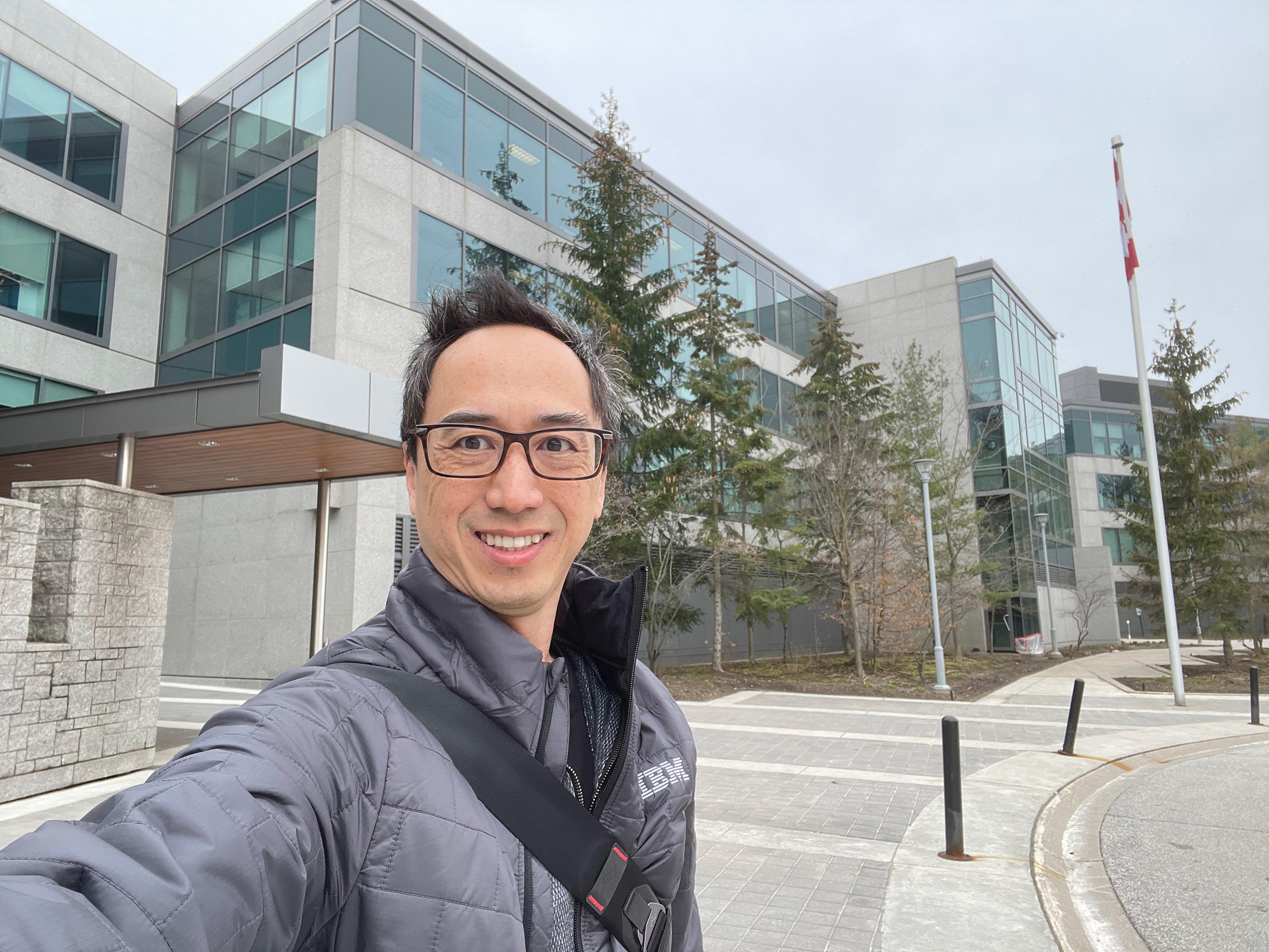
Kevin Yu
Today's Guests

